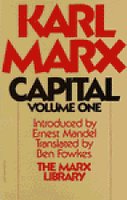 I’m learning anew how to read Marx’s Capital: Volume One by watching David Harvey’s famous course on the subject. (All 13 lectures are available online. Originally published in 1867, Harvey teaches from the 1976 Vintage edition of Capital, translated into English by Ben Fowkes.) Harvey has been teaching Capital for over 40 years now, starting when he arrived in Baltimore during the summer of 1969—where the Brit took a position at Johns Hopkins—because he was in search of a framework from which to understand the radical and reactionary politics of that year. His many years of experience teaching Capital show. Harvey demonstrates the brilliance of a teacher who has not only mastered the subject, but who also has a passion for it.
I’m learning anew how to read Marx’s Capital: Volume One by watching David Harvey’s famous course on the subject. (All 13 lectures are available online. Originally published in 1867, Harvey teaches from the 1976 Vintage edition of Capital, translated into English by Ben Fowkes.) Harvey has been teaching Capital for over 40 years now, starting when he arrived in Baltimore during the summer of 1969—where the Brit took a position at Johns Hopkins—because he was in search of a framework from which to understand the radical and reactionary politics of that year. His many years of experience teaching Capital show. Harvey demonstrates the brilliance of a teacher who has not only mastered the subject, but who also has a passion for it.
Harvey is passionate about the merits of Capital, and not merely as a way to think about capitalism—although Harvey is indeed bullish on that aspect of Capital. Rather what is so striking about Harvey’s take on Capital
is that he loves it as a Great Book. Harvey has reinforced for me that Capital
is a masterful literary construction. (A forthcoming book by William Claire Roberts, Marx’s Inferno: A Political Theory of Capital, seems likely to do the same. “Placing Marx against the background of nineteenth-century socialism, Roberts shows how Capital was ingeniously modeled on Dante’s Inferno, and how Marx, playing the role of Virgil for the proletariat, introduced partisans of workers’ emancipation to the secret depths of the modern “social Hell.” In this manner, Marx revised republican ideas of freedom in response to the rise of capitalism.” Wow that sounds cool.)
In thinking of Capital in literary terms, Harvey argues that it is meant to be read cover to cover, not sliced up into select passages, as tends to be the case when graduate students first confront Capital, alongside Weber, Durkheim, Foucault, and other usual suspects. This explains Harvey’s pedagogical approach: his lectures constantly involve intricately close readings of the text.
Harvey advises students to “have a good time talking to the text and letting it talk to you,” and takes his own advice, such as when he pokes fun at Marx’s “modest” claims, sprinkled throughout Capital, that no one has every thought about things quite like he has. Harvey says that teaching the same book over and over again might sound boring, but that every time he reads Capital he discovers something new in it, or thinks about it differently due to changed circumstances. He also learns from his students. He once taught it to an English department during the heyday of Derrida. Harvey joked that they never got past the first chapter because his students felt compelled to deconstruct every last word, which he found frustrating even as he learned something new.
Harvey’s first lecture does a wonderful job of introducing students to the project of Capital
in broad strokes. Marx placed Capital, we learn, into conversation with three distinct intellectual traditions, each with its own national origins. First and foremost, Capital is put into extensive critical dialogue with classic bourgeois political economics that was mostly British in origins and was best represented by Ricardo and Smith. Second, in a continuation of Marx’s earlier writings, Capital speaks to German philosophy of the classical tradition that goes back to the Greeks and that was best practiced by Kant and Hegel. Third, and less known, Marx builds upon the work of French utopian socialists like St. Simon, Proudhon, and Fourier. This third discourse is perhaps the least known influence on Capital but Harvey argues Marx drew on French utopian socialism even in his harsh criticism of it. Whereas the utopian socialists imagined a future without any roadmap of how to get there, Marx believed such a future impossible prior to a thorough reckoning with the “here and now” otherwise known as capitalism.
Building on these three philosophical traditions, Marx hoped to map out the capitalist mode of production in all its various complexities. Indeed, such an undertaking had become Marx’s life project. He planned several volumes but only witnessed the publication of Volume One. Volumes Two and Three were published posthumously.
Marx was a pioneer in a method of analysis that became common by the twentieth century: that is, Marx taught us how to go beneath the surface of things to get at root concepts. This was Marx’s way of situating everyday experience in a larger structural apparatus. Harvey’s reading of Marx makes clear that Marx’s approach was not meant to confine but rather to serve as an opening.
Harvey is particularly good at helping his students understand Marx’s seemingly peculiar writing style. Marx wrote in a way that we as readers are no longer familiar with. Not “brick-by-brick,” driving home concept after concept, as Harvey says we now write. Rather Marx’s writing style was a methodical unfolding of a conceptual apparatus–as if he were peeling an onion (one of Harvey’s many useful metaphors). The first few chapters of Capital are quite difficult for this reason—Marx never drew up the type of signposts that we are now so used to as guides when we read books.
Capital exemplifies Marx’s dialectical method. Harvey explains Marxist dialectic is not about causation, but rather about internal relations and mechanisms. Everything is in motion; capital is a process. When things stop moving, systems come tumbling down. In Harvey’s words to describe Marx’s ideas, capital is “perpetually on the road.” The Marxist dialectic on display in Capital never reaches “synthesis” in the sense of the Hegelian dialectic (thesis-> antithesis-> synthesis). For Marx each point that seems to come to an end in fact represents a new tension, a new contradiction, that unfolds another layer.
To put this another way: whereas Hegel’s synthesis becomes a universal ideal—as when Napoleon represented the “world-spirit on horseback”—for Marx such seeming universal resolutions are always also particular, and when the particular resurfaces, which it must, the system is thrown into crisis. But “contradictions are generative” because capital is “perpetually on the road” to finding new universals. Harvey explains this aspect of the Marxist dialect by way of a close reading of Capital’s analysis of the money commodity. The capitalist process by which commodities are put into a system of exchange with one another eventually leads to what Marx calls the “universal equivalent,” that is, a commodity such as gold that stands in as a generic signifier of all commodity value. But gold, even as the “universal equivalent,” is always also particular in that it, like any ordinary commodity, is subject to the turbulences of its own market. When gold no longer suffices as a generic signifier for all commodities because it is too specific as a commodity of its own (as happened in the 1970s) capitalism generates a new “universal equivalent” (like U.S. dollars).
In my next post on Harvey’s Capital lectures I will break down his excellent analysis of commodity fetishism.


5 Thoughts on this Post
S-USIH Comment Policy
We ask that those who participate in the discussions generated in the Comments section do so with the same decorum as they would in any other academic setting or context. Since the USIH bloggers write under our real names, we would prefer that our commenters also identify themselves by their real name. As our primary goal is to stimulate and engage in fruitful and productive discussion, ad hominem attacks (personal or professional), unnecessary insults, and/or mean-spiritedness have no place in the USIH Blog’s Comments section. Therefore, we reserve the right to remove any comments that contain any of the above and/or are not intended to further the discussion of the topic of the post. We welcome suggestions for corrections to any of our posts. As the official blog of the Society of US Intellectual History, we hope to foster a diverse community of scholars and readers who engage with one another in discussions of US intellectual history, broadly understood.
I’m looking forward to these future posts, Andrew. I’ve been trying to get pals to read Capital with me (using Harvey as a guide) for months now, but to no avail. Kids these days, no one wants to read Marx anymore…
In defense of the kids, reading Capital is no small task. But Harvey’s video lectures help a lot!
I’m seriously interested, as you might expect, in Harvey’s literary take on Marx’s Capital. Some criticized the inclusion of that work in the 1952 Britannica set, and not just for ideological, Cold War reasons. That Harvey treats the work as a perpetually rereadable work for both its ideas *and* its form says something interesting about the mid-century liberals who selected Capital as a great book.
Does Harvey recommend reading it without apparatus, just as the mid-century great bookies did? If he does recommend an accompaniment, what is it?
Finally, it sounds as if Harvey contextualizes it vertically, in relation to ideas preceding and following (i.e. root concepts, deeper influences, “great ideas”). How does he approach it horizontally, in relation to its historical material surrounding influences? – TL
Tim: Harvey doesn’t really recommend an accompaniment as far as I can tell, except that his lecture serve as such and he also has a book out based on his Capital lectures: A COMPANION TO MARX’S CAPITAL (2010).
Harvey’s close reading of the text in these lectures does not seem to do that much “horizontal” (as you call it) contextualization. At least so far–I have several lectures to go. He does at times stop to put the ideas in contemporary context. His 2010 book ENIGMA OF CAPITAL is an analysis of the financial collapse of 2008 that is deeply indebted to his longstanding engagement with CAPITAL.
Thanks! I was using “vertical” as a synonym for chronological context. And of course you’re right that Harvey’s lecture itself is the apparatus.